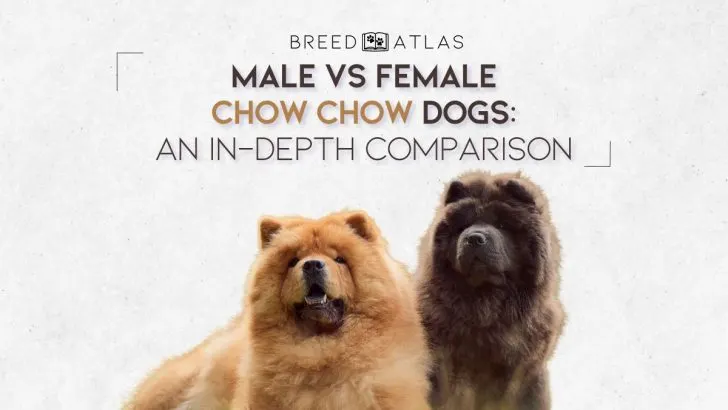Of course they are fluffy and absolutely gorgeous. But the debate between male vs female Chow Chows isn’t just about their stunning looks. It is more about their personality traits, health issues, and adaptability to various family dynamics.
Originating from Northern China, the Chow Chow is an ancient breed, known for its lion-like mane and unique blue-black tongue.
When considering adding such dogs to your family, it’s very important to understand the nuances that differentiate their male and female counterparts.
Differences in size, demeanor, and even grooming needs become apparent between the two.
Understanding these differences is crucial for potential owners to ensure that their chosen doggo aligns with their lifestyle and expectations.
Not sure which gender to choose? Let’s say a few words about boy and girl Chow dogs!
Is There A Big Difference Between A Female And A Male Chow Chow?
Absolutely, and getting to know these differences can offer you a better insight into what to expect.
Often, when we talk about dog breeds, we focus on the traits that define them as a whole.
However, diving into the gender specifics of the Chow Chow breed reveals a fascinating layer of their unique personalities and needs. We will get to that later, of course.
But first, let’s talk about their physical differences.
Key Differences In Physical Characteristics
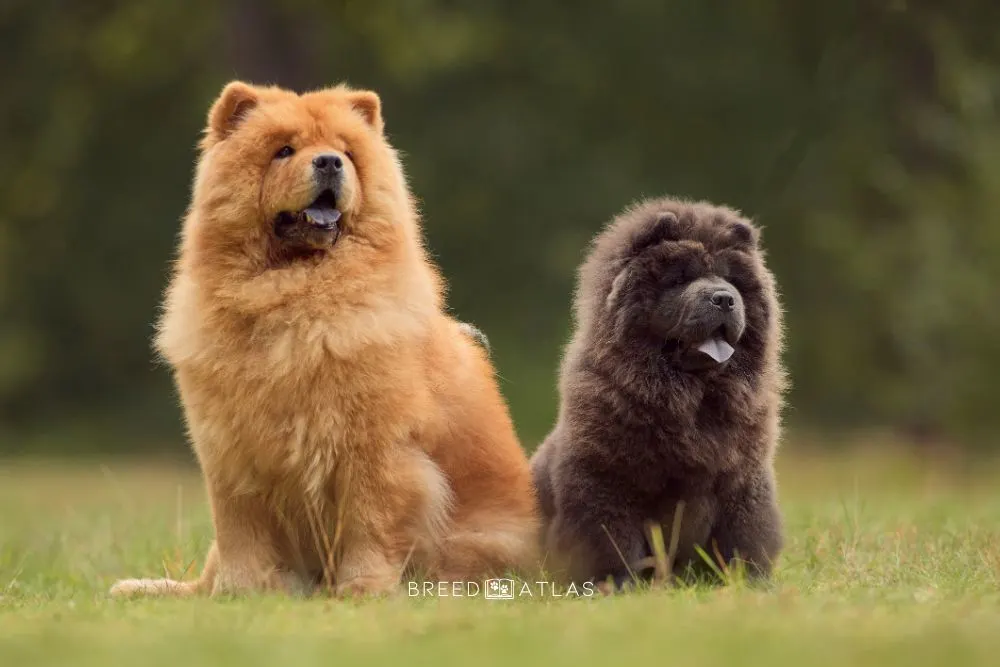
Males, as with many dog breeds, typically display sturdy physical features such as a more robust and sturdy frame.
In the case of the Chow Chow, this translates to a heavier bone structure, giving them a more formidable presence.
According to the American Kennel Club (AKC) standards, male Chow Chows often exhibit broader shoulders and a more pronounced head, which contribute to their imposing stature.
When you think about it, this robust frame is not just for show. It is there to support their muscular build and endurance, which were essential traits for their historical roles in China.
Females, on the other hand, while also meeting the AKC standards for the breed, tend to have a slightly more refined bone structure. This doesn’t mean they’re any less impressive though.
In fact, their elegance is one of their defining features.
Like many canine girlies, female Chow Chows may appear more graceful, with a slightly lighter frame and less bulk around the shoulders.
This refinement extends to their facial features, which may be softer compared to the bold, lion-like appearance of their male counterparts.
Size And Weight
“Are male Chow Chows bigger than females?” This is a question many prospective Chow Chow owners wrap their head around.
The answer is, generally, yes. Male Chow Chows typically are larger than their female counterparts, both in height and weight.
To give you a clearer picture on their physiological differences, let’s refer to the following chart:
| Gender | Height | Weight |
|---|---|---|
| Male | 19 – 22 inches | 55 – 70 pounds |
| Female | 18 – 20 inches | 45 – 60 pounds |
Now, you may have an idea on how big do Chows get. You can imagine that a bigger dog like a boy Chow Chow might require more space to roam and more food to sustain its energy.
On the flip side, a female, being slightly smaller, might fit better in smaller living spaces and could have slightly lower food requirements. That is something to take into consideration.
Personality Traits
Male and female Chow Chows show significant differences not just in their physiological makeup but also in their behavior and how they interact with their human families and other pets.
This amazing dog breed, known for its dignified and somewhat aloof demeanor, exhibits certain temperament traits that are influenced by gender.
A notable point is that breed, age, and various environments play significant roles in shaping the personality traits of dogs. Research has shown these factors to be closely associated with the development of a dog’s temperament.
So, how does a male Chow Chow temperament compare to that of a female? To better understand these pups, we will delve into the true Chow personality.
What Is The Personality Of A Chow Chow Male?
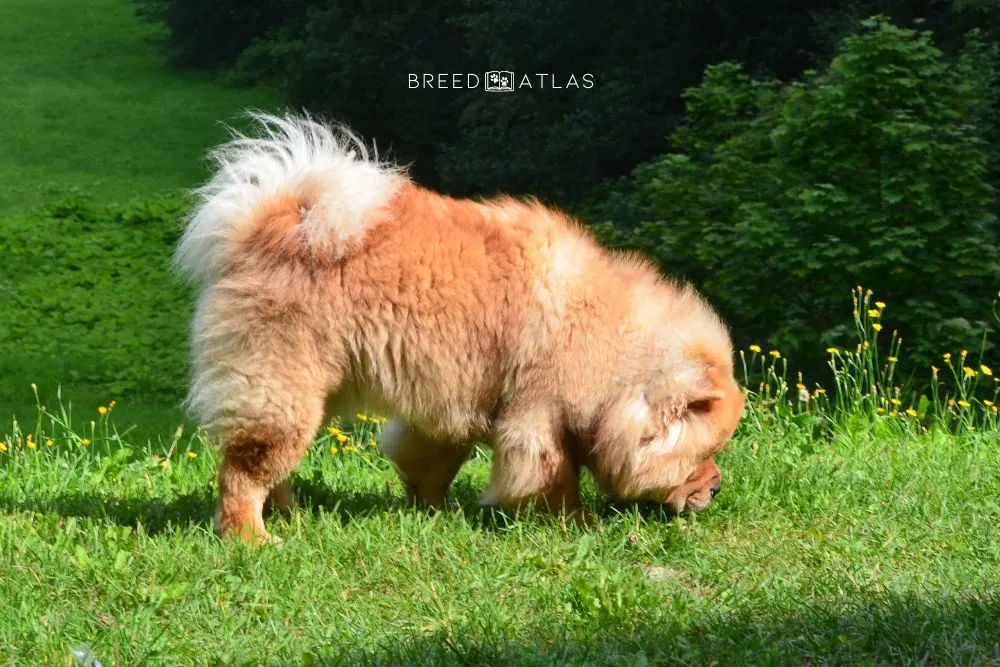
Male Chow Chows often embody the breed’s reputation for having a mean temperament. However, a closer look reveals that they are actually assertive and protective.
Note that their protective nature doesn’t necessarily translate to an aggressive dog. Rather, it comes from a deep-seated loyalty and an instinctive drive to safeguard their family.
Such traits make male Chow Chows excellent watchdogs. They are constantly vigilant and ready to alert their owners to new people or potential threats.
They are also known for their playful and active nature, behaving a lot like little puppies!
They show a level of independence though. It might come off as stubbornness and this requires a firm, consistent hand in training.
Boy Chows tend to display more dominant and territorial behaviors. This can sometimes make them seem easily distracted, especially in the presence of unfamiliar dogs or when they sense a challenge to their territory.
What Is The Behavior Of A Female Chow Chow?
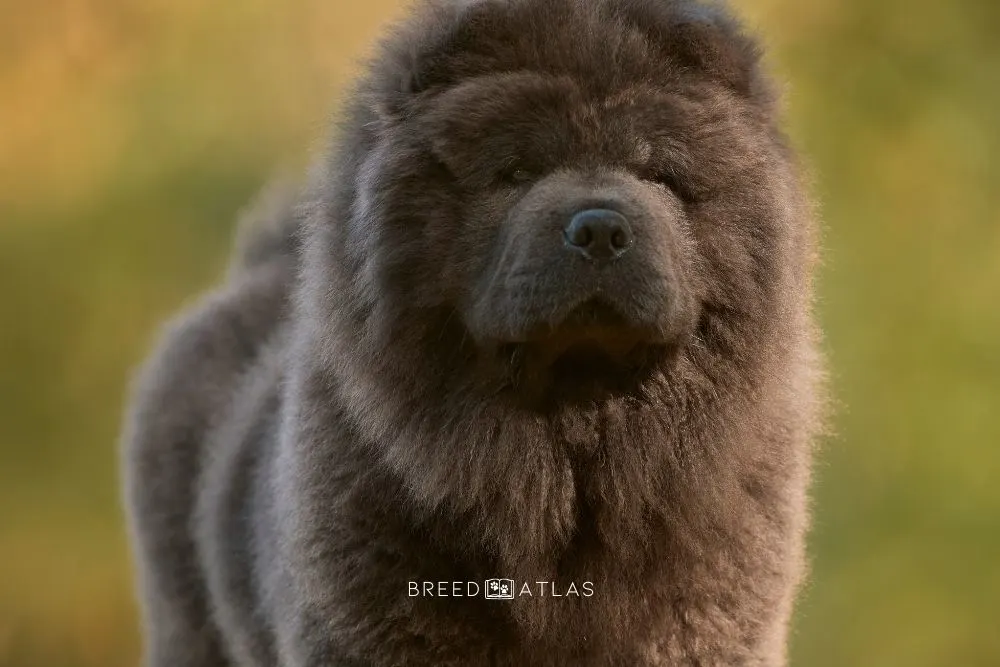
Now, you might wonder, “Are female dogs calmer than males?”
Generally, females can indeed exhibit a calmer demeanor compared to their male counterparts. This isn’t to say they lack the protective nature the breed is known for. They might express it in a less overt manner.
Female Chow Chows are known for their independent streak. However, this independence is paired with clear sensitivity to their surroundings, making them quite adaptable.
They excel in forming strong bonds with their owners, often becoming deeply attached to individuals they trust. This could be linked to their maternal instincts, which also contribute to their ability to form strong, lasting bonds with family members.
Nevertheless, this emotional intelligence allows these girls to thrive in a variety of settings. They easily adjust to changes while maintaining their composure.
Keep in mind though, female Chow Chows can still show territorial or protective behaviors. Especially if they feel their home or loved ones are threatened.
Dominance and territorial behavior are not exclusive to males. Unspayed females can exhibit similar traits, especially when in heat.
Maturity Differences
Female Chow Chows generally reach maturity faster than males – both physically and mentally. It is the same with humans, am I right?
Well, this fast-paced maturity means females often exhibit a quicker understanding of training commands and can adapt to household rules and routines more swiftly. We will get to that in the training section.
On the other hand, male Chow Chows may take a bit longer to mature.
As mentioned earlier, this extended journey to adulthood can manifest as prolonged periods of puppy-like behavior.
Many owners do not mind the prolonged puppy-like playfulness and a higher energy level. But it comes with a slower adoption of training commands.
The delayed maturity in males might require owners to invest more time and patience in their training and socialization to ensure they grow into well-adjusted adults.
Training And Socialization
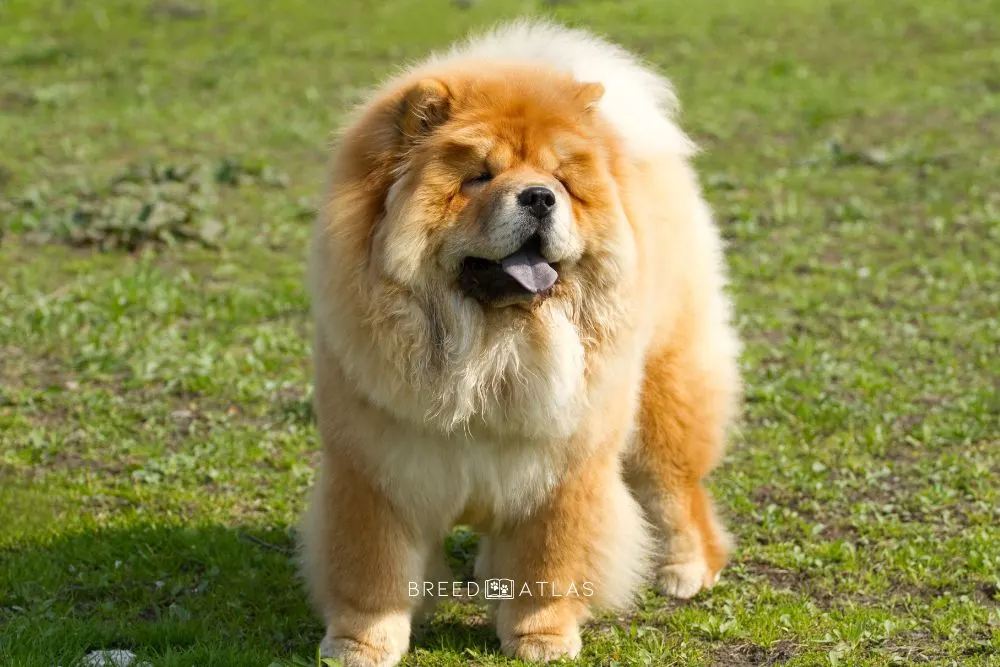
The differences between male vs female Chow Chows in terms of training and socialization are pretty much linked to the differences in their personality and maturity.
Overall, as a pure breed, these dogs tend to be on the difficult-to-train side. However, if you decide on a certain Chow Chow mix, you might be in for a surprise, as such pups may inherit the other parent’s trainability traits.
Gender-Specific Training Considerations
As we have previously mentioned, female Chows often have a bit of an edge in maturity. This trait makes them quick on the uptake with easy commands and training in general. They often show impressive progress in training sessions.
But let’s not count the boys out! While they may take a bit longer to get the hang of things, both genders have the potential to excel, especially with the right approach.
Both male and female Chows may engage in rough play, and it’s crucial to teach them bite inhibition early on. This is to make sure that playtime remains fun and safe for everyone involved.
If you are a first time dog owner, or first time Chow Chow owner, you may want to consider professional trainers. Training classes come highly recommended not just for your Chow but for you as well.
These classes are great for learning how to be clear and consistent, while helping your dog understand exactly what you’re asking of them.
Crate and leash training are also important items on the training checklist. Crate training offers a safe way to contain your Chow when needed. It is also good to make them get used to it when housebreaking.
Leash training, especially for those eager to chase every squirrel or bunny, can be a test of patience.
As with any dog, positive reinforcement is the way to go. Include tasty rewards and words of praise each training session. It might take time, but consistency is key.
Socialization
Early socialization is super important for shaping your Chow into a nice and polite puppy. And it is crucial to start this journey early.
This includes introducing them to a variety of people, places, and yes, even other animals.
This early exposure helps your pup understand the world’s diversity and teaches nice manners. However, don’t be surprised if they’re not keen on making friends with smaller animals due to their natural prey drive.
Keep in mind that both male and female Chow Chows are not typically fans of strangers. At some point, everyone will want to approach your majestic lion-like dog. The last thing you want to do is have your furry friend bite someone.
That said, teaching them to be sociable when they’re young will make a big difference in how they react to new people.
It is important to bring them to as many new places as possible. While they are young, let people pet and hold your Chow, but keep a close eye on the pup’s comfort levels.
Remember, your little furball might not have all their vaccinations yet, so be mindful of their interactions, especially with older dogs.
If you are welcoming a new Chow puppy to your large family, make sure to properly introduce them to young children, older children, and other family members.
Let your family hold and treat your pup. This can teach the Chow puppy to link human touch with yummy rewards, making social encounters something to look forward to.
Getting them used to being handled, examined, and groomed early on also sets the stage for easier care routines later in life.
With their basic needs met, a Chow pup has a good chance of growing up into a well-behaved and happy adult dog.
Do Chow Chows Pick One Person?
This breed may have a tendency to pick “The One”.
It’s not uncommon for a Chow Chow to form an especially strong bond with one person in the household.
When a Chow Chow decides you’re their person, it’s a done deal – no applications or interviews required. You become their devoted companion and they follow you everywhere! And really, there’s not much anyone can do about it.
However, this doesn’t mean they can’t be affectionate or loyal to other family members. With early socialization and positive interactions, Chow Chows can learn to show love and respect to all members of the family.
But yes, they might still have that one special person they are particularly drawn to!
Grooming And Care
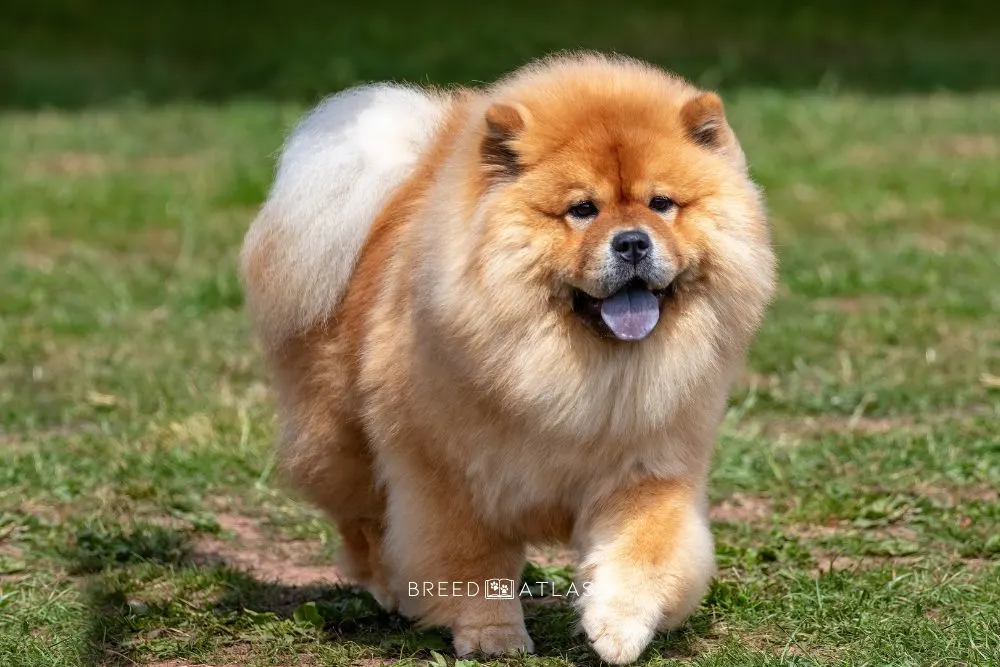
Well, there is one thing that I can say to you – embrace the fluff.
When it comes to grooming a Chow Chow, there’s no gender bias. Both males and females are equally blessed with an abundance of hair that seems to have a mind of its own.
Yes, they’re as fluffy as they are charming, and they shed enough to make you wonder if there’s another Chow hiding somewhere in all that fur!
The Chow Chow sports a double coat: a soft, dense undercoat for insulation and a rougher outer coat that repels water. As you can imagine, this combination requires a bit of work to keep in top condition.
Considering their luscious fur, daily brushing is a must. This not only helps manage shedding but also prevents mats and tangles, which can be quite uncomfortable. It also helps you see if there is any flea debris, living fleas, or even ticks.
For this task, you’ll want a variety of brushes: a slicker brush to deal with mats, a wide-toothed comb for the undercoat, and a bristle brush for the finishing touches. Each has its place and is the best fit for different parts of their grooming needs.
Bathing your Chow isn’t an every-week affair. Thanks to their coat’s natural resistance to dirt, you’ll only need to bathe them when they truly get dirty.
In case you have trouble grooming your Chow, take them to a professional groomer. They will definitely give you some good tips.
It might be difficult to handle so much fluff, but it’s pretty rewarding to see them all shiny and fabulous after a good grooming session!
Common Health Issues
In terms of gender-specific health conditions, there’s not a big difference in what male and female Chows might face.
When we talk about the breed as a whole, there are a few genetic health issues that Chow Chow parents should be aware of:
- Skin and Coat Conditions: Chow Chows are prone to a variety of skin issues, such as allergies, hot spots, and infections, due to their dense fur. Pemphigus foliaceus is a common skin problem within the breed.
- Eye Diseases: Both male and female Chows can suffer from eye conditions like entropion and ectropion. Such eye condition is also seen in Cane Corsos, Boxers, Great Danes, and Bulldogs.
- Malignant Melanoma: This type of skin cancer can affect older Chow Chows of both genders. It’s characterized by the development of malignant tumors, often in pigmented tissues.
Certain health issues can be more prevalent or manifest differently based on gender.
For instance, males might be at a slightly higher risk for heart and joint-related conditions. Females might have their unique set of reproductive health concerns (pyometra, mammary tumors).
Make sure to read thoroughly about these health issues. Understanding them can help you ensure a healthy life for your fluffy companion.
What Is The Lifespan Of A Chow Chow?
Generally, there’s not a significant difference in lifespan between male and female Chow Chows based solely on their gender. Both can expect to enjoy a life ranging roughly from 8 to 12 years.
The key factors that influence their longevity include genetics, health care, nutrition, and the level of preventive care they receive throughout their lives, rather than whether they are male or female.
However, it’s interesting to note that in the broader canine world, some studies suggest that spayed females may enjoy a slightly longer lifespan compared to their male counterparts, partly due to the reduction of risks associated with reproductive diseases.
Male Vs Female Chow Chow: Making The Right Choice
Choosing between a male vs female Chow Chow might be a bit tricky. Hmm, will it be the somewhat mischievous but always loyal male Chow? Or perhaps the intelligent, slightly more composed female?
Beyond the initial distinctions in size, temperament, and perhaps a few gender-specific behaviors, both genders share that unmistakable aura of dignity and loyalty that defines this amazing dog breed.
At the heart of it, you might just discover they’re not so different after all!

Meet Iram, a devoted veterinarian, passionate dog lover, and current Ph.D. candidate at Utrecht University in the Netherlands. Seamlessly blending her roles as a vet and content writer, Iram channels her love for dogs into heartfelt narratives.
Since childhood, Iram nurtured a dream of becoming a vet, a passion that runs deep in her family. Having now fulfilled that dream, she’s eager to share her acquired knowledge. In her writing, Iram not only explores the emotional bond between humans and their canine friends but also integrates her veterinary expertise, offering readers a holistic understanding of their beloved pets.
